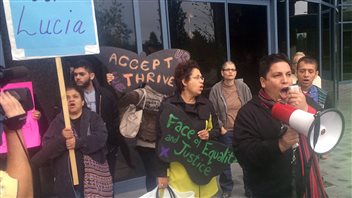The Canadian Council for Refugees (CCR) has questions for a coroner’s inquest into the death of Lucia Vega Jimenez in immigration detention last December. Jimenez was found hanging in a cell while in the custody of the Canada Border Services Agency in Vancouver.
Originally from Mexico, the 42-year-old hotel worker had been denied a refugee claim and had been deported from Canada three years before. Witnesses told the inquest she had returned to Canada probably through the United States.
She was stopped recently by Vancouver transit police over a fare issue and, when there was a problem with her identification, they contacted the Canada Border Services Agency, which took her into custody.

Jimenez said to have feared torture
Witnesses said that Jimenez was afraid of being sent back to Mexico because of problems with a boyfriend. A fellow detainee said she thought she would be tortured to death.
The CCR wants to know why the information about her death was not made public until a month after it occurred and only after local Mexican groups drew attention to it. It also wants to look at broader issues involving the detention of people under immigration law.
ListenDetainees need access to outside help, says advocate
“Our focus is particularly in terms of the role of non-governmental organizations that can offer services and can help people or at least give detainees somebody they can talk to if they are in distress which is often the case of people in immigration detention,” says Janet Dench, executive director of the CCR.
Such access is allowed for detainees in Toronto and Montreal, but not in Vancouver, where the border services agency has only a small detention facility at the airport.
Dench points out the Red Cross has said mental health care needs to be improved for immigration detainees and it is possible the coroner may make some recommendations in this regard. Although the scope of the inquest is limited, the coroner is charged with making recommendations to prevent deaths like that of Jimenez from occurring in future.

No independent oversight
This highlights an urgent need for an independent oversight mechanism for the Canada Border Services Agency, says Dench and is something the CCR has asked for repeatedly.
“This is what is quite extraordinary really,” she says. “In general, law enforcement agencies, police forces, et cetera in Canada—there is an external complaints mechanism so that if you feel that a police officer has abused their power in arresting or detaining someone, you don’t have to complain to the same police body that you’re complaining about. But in the case of the Canada Border Services Agency there is no external complaint mechanism. So if you have a complaint, you just complain to the CBSA itself. Of course that is not a very satisfactory situation.”
The Canadian Council for Refugees will monitor the coroner’s recommendations and closely watch to see whether they are implemented.







For reasons beyond our control, and for an undetermined period of time, our comment section is now closed. However, our social networks remain open to your contributions.